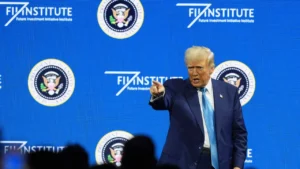Under pressure to act, White House says it’ll address formula shortage

The Biden administration announced Thursday that it is working with infant formula manufacturers to get more formula on shelves as quickly and safely as possible, following a call with major American retailers and manufacturers.
Infant formula has been in short supply for months, owing to pandemic-related supply chain issues. However, the shortage has reached crisis levels since four children became ill — and two died — after suspected bacterial contamination of formula originating from Abbot Nutrition’s formula plant in Sturgis, Michigan. The plant was shutdown amid an ongoing federal investigation, and the squeeze on the market has led to empty shelves across the country.
Within the last few weeks, many of the nation’s largest pharmacy and retail chains, including CVS, Walgreens, Target and Walmart, have instituted restrictions on how many formula items customers may purchase.
“The steps the president took today are an acknowledgement and a recognition that more needs to be done, that we do not want parents, mothers, families out there to be stressed and worried about feeding their babies,” White House press secretary Jen Psaki told reporters on Thursday. “We’re going to cut every element of red tape we can cut, we’re going to work with manufacturers, we’re going to import more to expedite this as quickly as possible.”
Among its announced actions, the White House said that it is working to make it easier for families using WIC benefits — also known as the federal Special Supplemental Nutriton Program for Women, Infants, and Children — to obtain formula. Families using WIC benefits make up about half of all infant formula purchases nationwide, though they’re generally limited to a relatively narrow variety of formula products. The U.S. Department of Agriculture is urging states to allow WIC families to use their benefits on a wider band of products to allow for purchases of different sizes or formula varieties.
Biden is also asking the Federal Trade Commission prosecute price gouging by retailers that have marked up formula prices, as well as online resellers who are scalping formula at jacked up prices, which drives scarcity. The Department of Justice is working with state attorneys general to monitor and address price gouging, and to pay attention to predatory behavior in the market.
The administration also said that it plans to announce new steps to increase the supply of infant formula imports from trading partners in Mexico, Chile, Ireland and the Netherlands.
“What we are seeing, which is an enormous problem, is hoarding. People hoarding because they’re fearful…and people hoarding because they are trying to profit off of fearful parents,” Psaki said.
Officials have seen increased formula productivity in the last four weeks, and in the four weeks leading up to the recall, Psaki said. But even amid ramped-up manufacturing, it seems that delays must be accounted for by worried parents. According to the Associated Press, Abbot claimed that its shuttered plant could be running within two weeks of FDA approval. It would then take six to eight weeks for that formula to hit shelves.
In the meantime, experts and officials are urging that parents refrain from mixing their own formulas, and call their family doctor or pediatrician if they need help finding formula.







